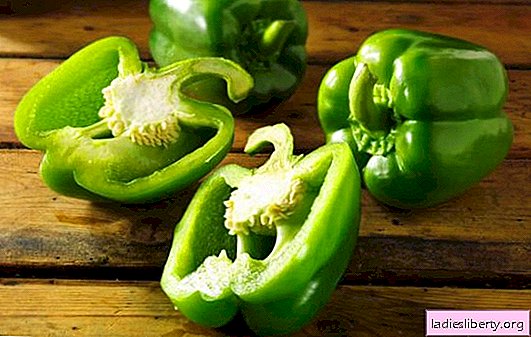
Green pepper has repeatedly been on the table of any housewife, giving the dishes an interesting taste and unusual look. But what do people know about the benefits of this amazing and such a popular vegetable?
Green pepper: description, composition, nutritional value
Green pepper was first grown in America and only many years later this unusual variety spread around the world. Green pepper varieties belong to the family of nightshade crops. Interestingly, peppers during overriding can suddenly change color to red, yellow, orange, but, as a rule, the “green stage” is the most useful.
Green pepper has a spherical and rounded shape. He has small yellow seeds. This variety of pepper is able to grow at any time of the year, provided that it creates a familiar - tropical habitat.
Inside, the pepper is empty, which makes it stand out in the cooking area and makes it an indispensable component of some dishes. Pepper has a pleasant sweet taste and, unlike the colored representatives of this culture, does not have a bitter aftertaste. Green peppers are actively used by housewives for cooking unusual dishes. It is filled with various fillings: meat, cereals, vegetables. The weight of this pepper is from 100 to 300 grams.
As for the content of nutrients in this vegetable, it has a record content of vitamin C. In addition, green pepper is rich in vitamins A and E.
Moreover, green pepper is low-calorie - only 20-30 kcal per fruit, which, of course, will delight people who monitor the state of their figure.
Useful properties of green pepper
All vegetables are incredibly useful and necessary for the human body, but green pepper stands out for its positive properties:
• Positive effect on the functioning of the cardiovascular system
• Stabilizes the gastrointestinal tract
• Improves blood cholesterol
• Positive effect on the functioning of the nervous system
• Provokes appetite
• Stabilizes blood pressure
• Thins the blood
• Stabilizes sleep quality
• Contains various vitamins, minerals and minerals
• Improves the condition of hair, skin and nails
• Prevents Anemia
• Positive effect on gums and teeth
Green pepper, as you can see above, has a huge list of useful properties that affect the human body. Pepper will become a particularly necessary product in the diet for people who are at risk for cardiovascular diseases.
Also, green pepper has a positive effect on the human nervous system: improves memory, helps concentration, activates thinking.
The composition of green pepper contains such elements necessary for the full development of man as iron, zinc, manganese, copper, potassium, sodium, calcium, phosphorus, magnesium. The vegetable is also rich in vitamins: a group of vitamins B, C, E, A, a rare vitamin K. Moreover, Bulgarian green pepper contains acids necessary for the body: Omega - 3, 6, 9.
Moreover, green pepper is known for its serotonin hormone. This hormone improves mood, stabilizes sleep and even helps to get out of depression. The effect of green pepper is similar to the use of chocolate, only pepper, unlike its rival, is low-calorie and liquefy excess fat in the body.
Possible harm and contraindications to the use of green pepper
Of course, green pepper is a healthy vegetable, but, unfortunately, it contains pesticides - substances that process beds with garden plants in order to destroy insects. Such a problem can easily be avoided by buying green peppers at recommended food brands or growing healthy vegetables on their own.
However, green pepper has its contraindications. This vegetable is not recommended for people with the following diseases.:
• Ischemia
• Angina pectoris
• colitis
• Epilepsy
• gastritis
• Diseases of the liver and kidneys
• High blood pressure
• stomach ulcer
• Sleep disturbance
• Hemorrhoids
Also, the rate of consumption of the product should be monitored.
Green pepper in cooking
Pepper in cooking is an extensive topic that contains hundreds of delicious recipes. Almost everyone saw and tried stuffed stewed green peppers. This is not the only use case for this amazing product. Green pepper is the basis of some soups, salads, and it is also used in cooking fish and meat dishes. What is the famous lecho of pepper. Few people know, but they even make juice from green pepper, which, incidentally, is recommended for people suffering from diabetes.
The main rule in the preparation of this vegetable is to heat it last, since green pepper, unfortunately, quickly loses most of its useful properties at this moment. But who said pepper should not be eaten raw? Raw pepper is not only possible, but also needs to be eaten daily. Not subjected to heat treatment, the vegetable retains a maximum of vitamins, trace elements, macrocells and acids.
Pepper is common in the summer, but, like many vegetables, it can be easily left to feast and restore immunity in the winter season. There are many types of preservation of pepper in the cold season: canning, pickling, pickling, drying, drying, freezing, pickling. All these dishes will help not only restore the supply of vitamins and useful elements, but also find yourself in a warm and bright summer.
From all of the above, we can conclude that green pepper is a real find for the cook, because the range of dishes this vegetable offers us is huge.
Green pepper during pregnancy and lactation: benefit or harm?
The nutrition of the expectant mother during pregnancy is an important point, because the health of the child depends on this. It is very important that the baby has enough vitamins and elements for full development.
Pepper is an excellent vegetable to eat during pregnancy, because it improves the blood circulation of the expectant mother, and also removes excess fluid from the body, thereby preventing swelling - a big nuisance that aggravates the period of pregnancy.
Moreover, green pepper, included in the diet of the expectant mother, reduces the likelihood of having a child with physical defects, and also improves the development of the child’s nervous system, which reduces the likelihood of disorders from the central nervous system.
Also, the substances contained in green pepper prevent the development of toxicosis and increase stress resistance, which is so important for a vulnerable pregnant woman.
During breastfeeding, you should also not neglect green pepper in your diet, as it increases the fat content of milk and makes it more nutritious. Pepper perfectly affects the gastrointestinal tract of the child, helping to relieve pain with colic and preventing constipation.
Green pepper is a healthy and tasty vegetable. Its regular use normalizes the work of many important body systems, and its use in cooking perfectly diversifies the usual dishes.











